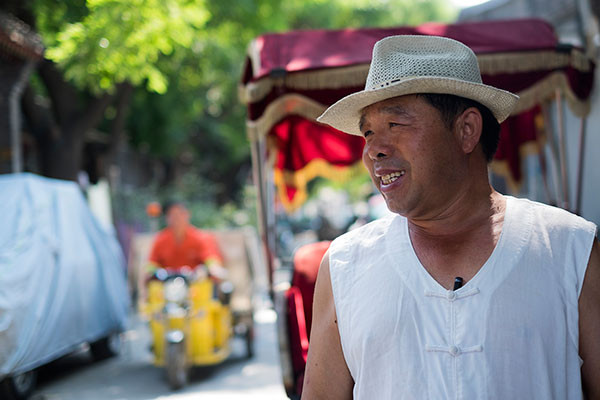
As a rickshaw driver in the hutong, Xin Ying Wu witnessed the rise of modern commercialization first-hand.[Photo provided to chinadaily.com.cn]
Beijing's hutongs, a network of labyrinthine lanes and alleys in the city's center, have been around for centuries. Mostly built in the Yuan dynasty, these historic neighborhoods are inextricably linked to Beijing’s culture.
Yet, despite their age, the popularity of the hutong among tourists and businesses is relatively recent. The rapid development of Nanluoguxiang, which brought in a wave of souvenir shops, bars and restaurants, occurred just within the past decade.
Nanluoguxiang is not the only hutong area that has seen the impact of rising hutong popularity. Many primarily residential hutong areas are now witnessing the steady creep of businesses and tourists.
As some hutongs undergo commercial development, the heart of these original communities is changing. Long-time residents are leaving, either forcibly or compensated with large sums of money. And as shops continue to occupy the spaces residents left, the culture of the hutong is at risk of changing, too.
A way of life
In the wintertime, Daniel McCrohan's hutong house is cold. He and his family pull up their long underwear and zip up their jackets when they're indoors, tiptoe across a frozen floor to use an unheated bathroom, and walk down the alleyway to use public showers.
This is all by choice. McCrohan, a freelance travel journalist from London who's written multiple editions of Lonely Planet's Beijing and China guides, lives in a traditional home in Langjia hutong.
"I like the fact that you feel the seasons," McCrohan said. "I know it's winter in the winter. And when summer comes around, you know it's summer because it's hot. It should be like that."
Of course, it wasn't just the bitter weather that prompted McCrohan to move to the hutong. Despite often lacking modern amenities, the hutong holds immense historical value, and, described McCrohan, offers a small-town feeling in the bustling city of Beijing.
McCrohan has been living in various hutongs for 10 years now. His residency represents a trend among foreigners living in Beijing; even with the availability of multi-room, high-rise apartments, expatriates in China are increasingly residing in hutong neighborhoods.
Source: chinadaily.com.cn




